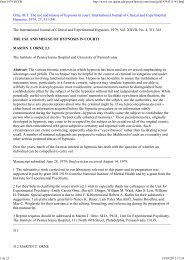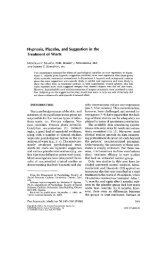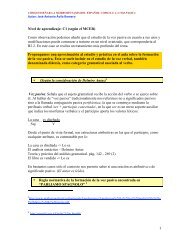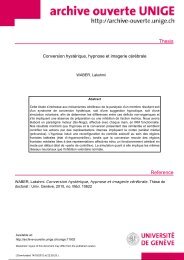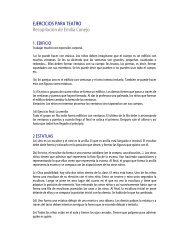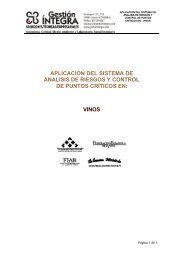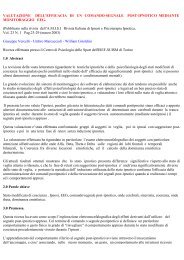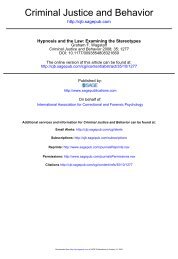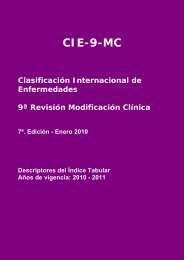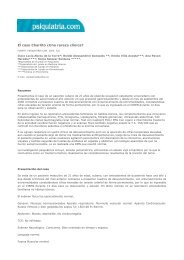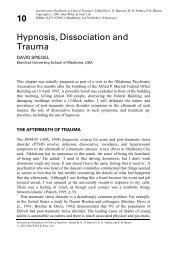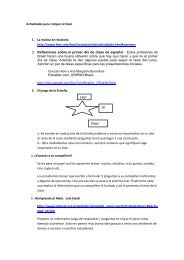Diccionario etimológico comparado de la lengua castellana
Diccionario etimológico comparado de la lengua castellana
Diccionario etimológico comparado de la lengua castellana
Create successful ePaper yourself
Turn your PDF publications into a flip-book with our unique Google optimized e-Paper software.
2568 I^AYÍÜ Mirüo<br />
Sin.—Faliqa . —Cansancio.<br />
Estas dos pa<strong>la</strong>bras indican una indisposición <strong>de</strong>l cuerpo<br />
ó <strong>de</strong>l espíritu que impi<strong>de</strong> el ejecutar alguna cosa.<br />
Cuando esta indisposición proviene <strong>de</strong> un trabajo <strong>de</strong>l<br />
cuerpo ó <strong>de</strong>l espíritu que lia apurado todas <strong>la</strong>s fuerzas,<br />
se le l<strong>la</strong>ma fatiga; cuando por el contrario, proviene <strong>de</strong><br />
un trabajo <strong>de</strong>masiado uniforme, ó <strong>de</strong> un trabajo que se<br />
<strong>de</strong>ia <strong>de</strong> buena gana, se le dá. el nombre <strong>de</strong> cansancio.<br />
Hab<strong>la</strong>ndo <strong>de</strong>l espíritu, se dice en el sentido <strong>de</strong> disgusto.<br />
Por ejemplo: «un ejército extenuado <strong>de</strong> fatiga^<br />
se hace re<strong>la</strong>ción á <strong>la</strong>s fuerzas corporales; y también «se<br />
hace <strong>la</strong> paz por el cansancio <strong>de</strong> <strong>la</strong> guerra» cansancio<br />
está tomado aquí en sentido <strong>de</strong> disgusto.<br />
Fatiga se toma algunas veces por el trabajo mismo;<br />
se dice indiferentemente, los trabajos y <strong>la</strong>s fatigas <strong>de</strong><br />
<strong>la</strong> guerra. Sin emb.argo. el uno es <strong>la</strong> causa y el btro<br />
el efecto. No se diría pues en el mismo sentido, el<br />
cansancio <strong>de</strong> <strong>la</strong> guerra.<br />
Fatiga-ción. f.<br />
Cfr. etim. fatigar. Suf. -ción.<br />
SIGN.— 1. fatiga:<br />
Assi por <strong>la</strong> tristeza <strong>de</strong>l corazón como con el tormento<br />
y fatigación <strong>de</strong> su cuerpo. Ayal. C. Prin. lib. 9. c. 8.<br />
2. ant. fig. IMPORTUNACIÓN,<br />
Fatiga-da-mente. adv. ni.<br />
Cfr. etim. fatigar f-adoj. Suf. -mente.<br />
SIGN— Con fatiga.<br />
Fatiga-dor, dora. adj.<br />
Cfr. etim. fatigar. Suf. -dor.<br />
SIGN.— Que fatiga á otro :<br />
No hai quien por honra ó gloria se fatigue, Fatigadorea<br />
sí, que don<strong>de</strong> coman Halló <strong>la</strong> industria que sus<br />
vientres sigue. Esquil . R. C. 1.<br />
Fat-igar. a.<br />
ETIM.— Del <strong>la</strong>t. fat-ig-are, fatigar,<br />
cansar, oprimir, acongojar, acosar; el<br />
cual se compone <strong>de</strong> fo.-t-^ abreviado <strong>de</strong><br />
fa-il-m, (<strong>de</strong> ""fatis), abundantemente,<br />
<strong>de</strong>masiado, é -ig-^ <strong>de</strong> a/y-ere, bacer, tratar,<br />
manejar, ejecutar, etc.; en <strong>la</strong> forma<br />
frecuentativa -ig-are^ como en cast-igare,<br />
primit. <strong>de</strong> castigar, prod-íg-are,<br />
prim. <strong>de</strong> prod-igar, etc. Para <strong>la</strong> etim.<br />
<strong>de</strong> ag-ere cfr. ag-ir, y para <strong>la</strong> <strong>de</strong> fa-ü-in<br />
cfr. fa-m-bre = hambre, (cfr. Paul D.<br />
p. II: Terentius af-fatim dixit pro eo<br />
quod est ad <strong>la</strong>ssitudimem). Etimológ.<br />
significa hacer, ejecutar una cosa muchas<br />
veces, hacer<strong>la</strong> repetidamente, y<br />
luego causar cansancio. De fatigare<br />
<strong>de</strong>scien<strong>de</strong> fatiga, y <strong>de</strong> éste fatig-oso,<br />
FATIGOSA-MENTE, FATIGA-DOR, FATIGADA-<br />
MENTE. De fatig-are se <strong>de</strong>riva fatig-atio,<br />
-tion-is, -tion-em, |)rim. <strong>de</strong> fatigación.<br />
Le correspon<strong>de</strong>n: i<strong>la</strong>l. faticare;<br />
franc. fatiguer; prov. fatigar; cat. fatigar;<br />
port. fatigar, etc. Cfr. <strong>de</strong>hiscente,<br />
FAMÉLICO, etc.<br />
SIGN.— 1. Causar fatiga. Ú. t. c. r. :<br />
No nos fatigues con voces alternas, no seas tan mudable<br />
y varia con nosotros. Com. 300. Copl. í).<br />
2. Vejar, molestar.<br />
3. Gcrin. hurtar.<br />
Fatigosa-mente. adv. m.<br />
Cfr. etim. fatigoso. Suf. -mente.<br />
SIGN.— Con fatiga.<br />
:<br />
Fatig-oso, osa. adj.<br />
Cfr. etim. fatiga. Suf. -oso.<br />
SIGN,- 1. Fatigado, agitado:<br />
Con passo <strong>la</strong>rgo y fatSgnso allega Ferrante Hispano y<br />
Beremundo Ibero, l'inc. Peí. lib. 2, oct. 4.<br />
2. Que causa fatiga.<br />
Fatim-ita. adj.<br />
ETIM.— Deriva <strong>de</strong> Fátima, hija única<br />
<strong>de</strong> Mahoma, jior medio <strong>de</strong>l suf. -ita (cfr.).<br />
Etimológ. significa <strong>de</strong>scendiente <strong>de</strong> Fátima.<br />
Derívase Fátima <strong>de</strong>l nombre árabe<br />
Fatimah.<br />
SICiN.— Descendiente <strong>de</strong> Fétima, hija única<br />
<strong>de</strong> Mahoma. Api. á pers,, ú. t. c. s.<br />
Fato. m.<br />
Cfr. etim. hado.<br />
SIGN.— 1. ant. hado.<br />
2. ant. hato.<br />
Fator. m.<br />
Cfr. etim. factor.<br />
SIGN.— ant. factor.<br />
Fator-aje. m.<br />
Cfr. etim. factor-aje.<br />
SIGN.— ant. factoría.<br />
Fator-ía^ f.<br />
Cfr. etim. factor-ía.<br />
SIGN.—ant. factoría.<br />
Fatu-i-dad. f.<br />
Cfr. etim. fatuo. Suf. -dad.<br />
SIGN.— 1. Falta <strong>de</strong> razón ó <strong>de</strong> entendimiento<br />
:<br />
Este <strong>de</strong>spropósito, á vista <strong>de</strong> una reprehensión tan<br />
seria y tan pesada, le glo.isaron á fatuidad insensata.<br />
Com. Chron. tom. 4, lib. 2, cap. 28.<br />
2. Dicho ó hecho necio.<br />
3. Presunción, vanidad infundada y ridicu<strong>la</strong>.<br />
Fa-tu-o, a. adj.<br />
ETIM.— Del <strong>la</strong>t. fa-iu-us., -a, -um, <strong>de</strong>sabrido,<br />
insípido ; fatuo, necio, tonto,<br />
simple. Sírvele <strong>de</strong> base <strong>la</strong> raíz fa-, <strong>de</strong><br />
<strong>la</strong> primit. gha-, estar entreabierto, tener<br />
grietas; bostezar; estar vacío, hueco,<br />
vano, ligero ; carecer, tener falta <strong>de</strong>,<br />
faltar; cuya aplicación cfr. en fa-me y<br />
FAMBRE. Etimológ. significa vacio, vano,<br />
ligero, y \\.\qqo necio, tonto. Be fa-tu-us<br />
<strong>de</strong>scien<strong>de</strong> fatui-tas, -tat-is, -tat-em, prim.<br />
<strong>de</strong> fatui-dad; in-fa-tu-are, entontecer,<br />
turbar ó embotar el entendimiento;<br />
primit. <strong>de</strong> infatuar (cfr. pref. in = en),<br />
<strong>de</strong> don<strong>de</strong> se <strong>de</strong>riva in-fatuació\. Le<br />
correspon<strong>de</strong>n: ital. fatuo; franc. y prov.<br />
fat; cat. fatuo; port. fatuo; ingl. fatuous,<br />
etc. Cfr. <strong>de</strong>hiscente, fatigar, etc.<br />
SIGN.— 1. Falto <strong>de</strong> razón ó entendimiento.<br />
Ú. t. c. s.



